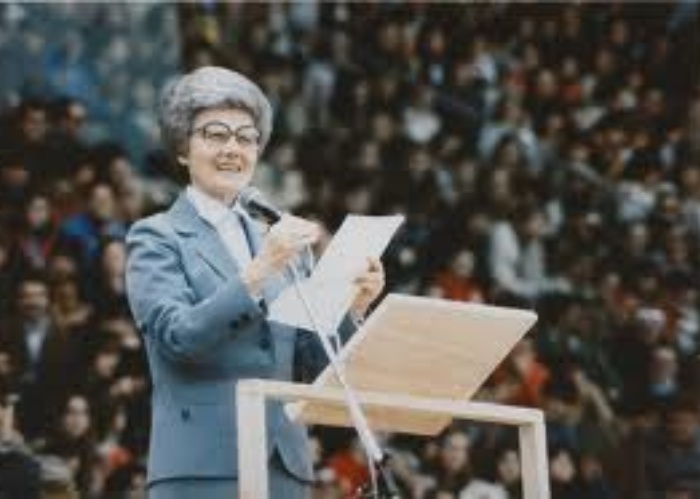
Jan 15, 2018 | Non categorizzato
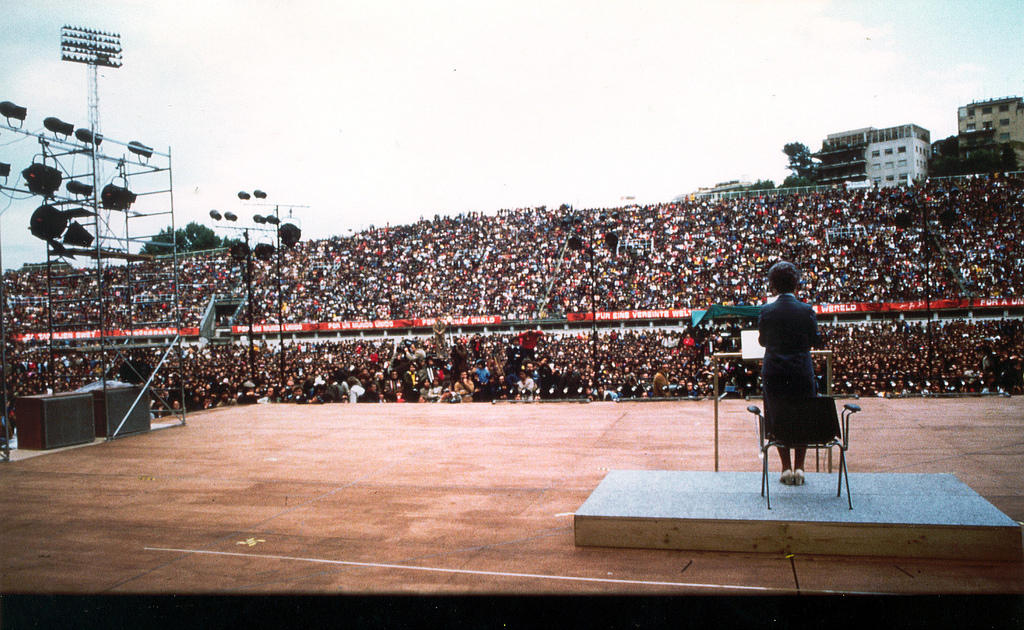 I was born and grew up in Macau, a former Portuguese colony is now part of Continental China, where I got to know the Ideal of unity at a Mariapolis. Macau is a small city that can be visited in few hours, so the invitation to take part in a Genfest in Rome, with thousands of young people from around the world – really appealed to me, even though I didn’t have least idea of what it was. We had just begun to live this ideal of unity, with other young people and a few women focolarini who often came to visit us and bring us the news and the concrete life of the Gospel that is lived in the Movement around the world. That world that I had known only through my geography lessons, but that now, with the Ideal of unity, had become smaller and nearer. Just arrived in Rome, several days earlier, we found ourselves in a house with lots of young people from Philippines, Hong Kong, Australia, Latin America…. How could I live with all of them? We Asians were a bit shy and, not knowing the language, we didn’t know how to communicate. Instead, there was no need to talk in order to understand one another, because we had same joy in common and from the very first, there as a very strong mutual understanding among all of us. After only a couple days, we already felt like we were one family. Then we learned that the title of the Genfest was: For A United World. The Genfest was going to be held at an open stadium, so I remember us praying a lot that it wouldn’t rain. Hundreds of buses from Europe were awaiting us. We learned that Chiara Lubich (whom I had not yet met in person) wanted the Genfest to be a moment of God. More than to the fest, Chiara brought us to the essential.
I was born and grew up in Macau, a former Portuguese colony is now part of Continental China, where I got to know the Ideal of unity at a Mariapolis. Macau is a small city that can be visited in few hours, so the invitation to take part in a Genfest in Rome, with thousands of young people from around the world – really appealed to me, even though I didn’t have least idea of what it was. We had just begun to live this ideal of unity, with other young people and a few women focolarini who often came to visit us and bring us the news and the concrete life of the Gospel that is lived in the Movement around the world. That world that I had known only through my geography lessons, but that now, with the Ideal of unity, had become smaller and nearer. Just arrived in Rome, several days earlier, we found ourselves in a house with lots of young people from Philippines, Hong Kong, Australia, Latin America…. How could I live with all of them? We Asians were a bit shy and, not knowing the language, we didn’t know how to communicate. Instead, there was no need to talk in order to understand one another, because we had same joy in common and from the very first, there as a very strong mutual understanding among all of us. After only a couple days, we already felt like we were one family. Then we learned that the title of the Genfest was: For A United World. The Genfest was going to be held at an open stadium, so I remember us praying a lot that it wouldn’t rain. Hundreds of buses from Europe were awaiting us. We learned that Chiara Lubich (whom I had not yet met in person) wanted the Genfest to be a moment of God. More than to the fest, Chiara brought us to the essential.

Chiara Lubich
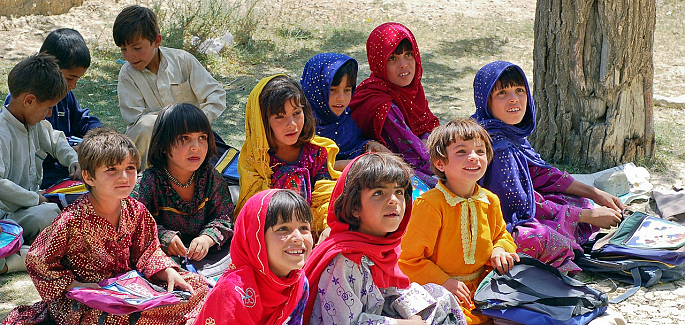
Jan 13, 2018 | Non categorizzato

Foto: Pixabay
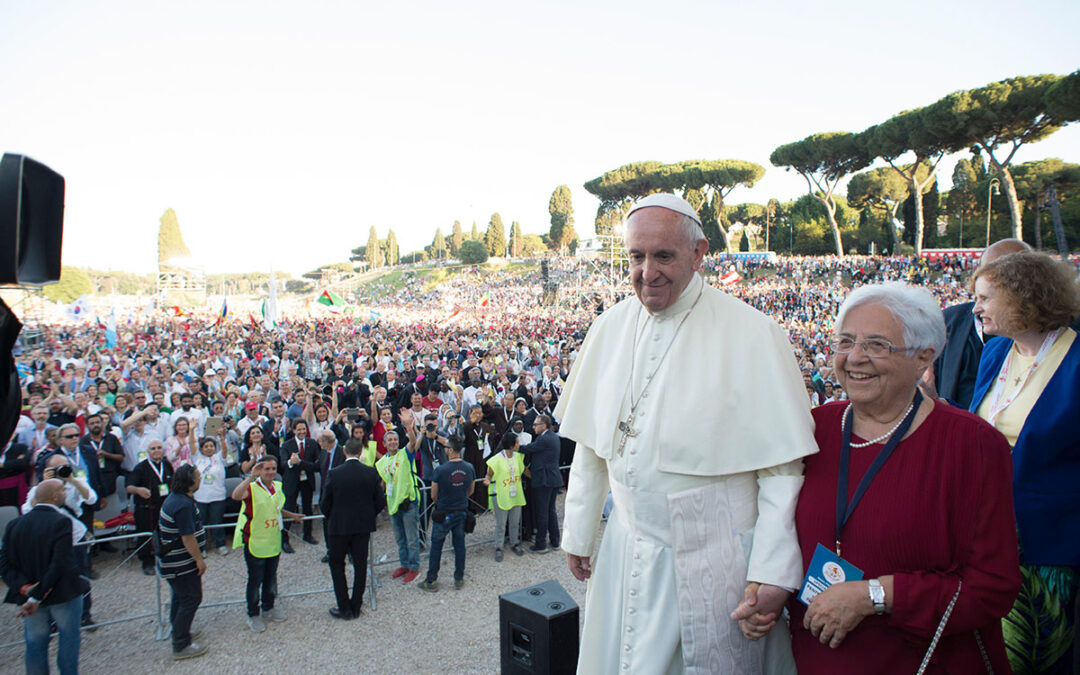
Jan 12, 2018 | Non categorizzato
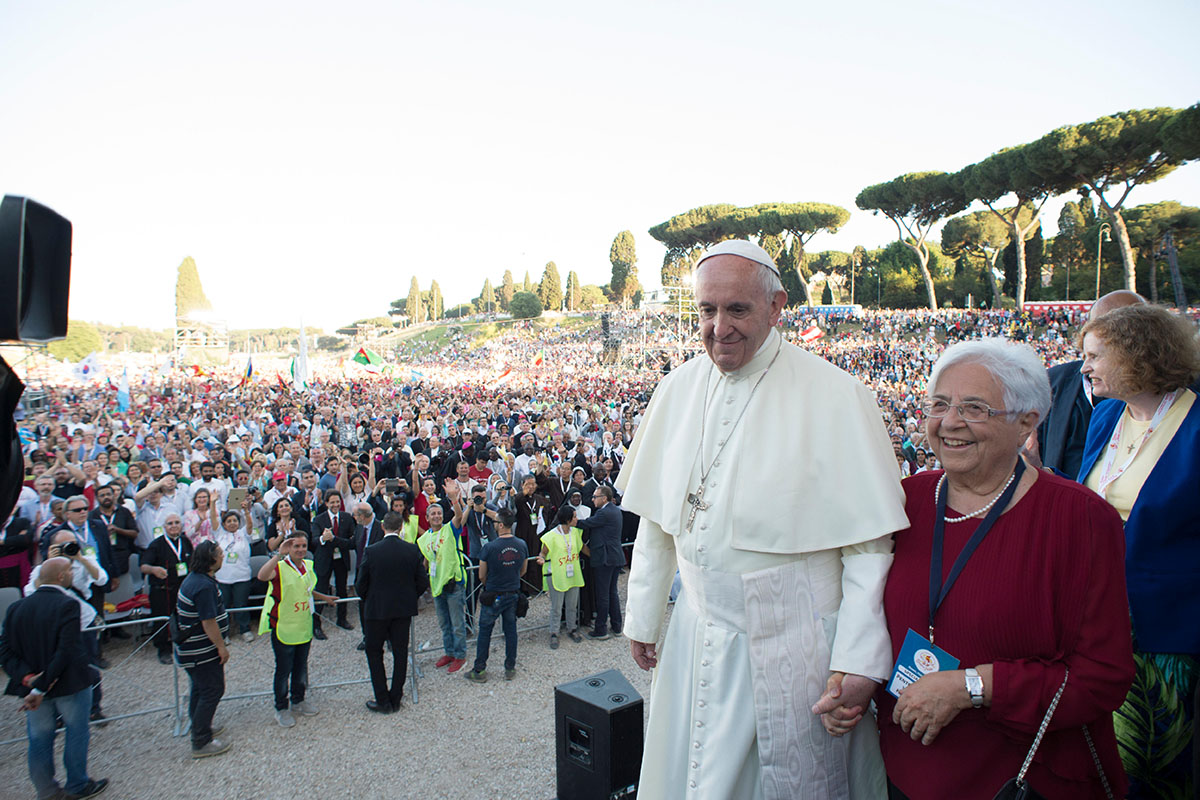
© Osservatore Romano
Jan 9, 2018 | Non categorizzato
On its 50th birth anniversary, the international Gen Verde band has recorded “TURN IT UP!” “It is an invitation,” they said, “to raise the volume of unity.” And this calls for a concrete, universal love that is able to take the initiative. This idea has toured the globe with the group, echoing in squares, schools and homes throughout the world. It has contaminated many and has become a life commitment. “As the year is about to end,”he artists added, “the idea has returned ’in a million hues’, sung by numberless voices, and danced with the fantasy of different peoples. And these 465 boys and girls from 31 cities of 21 countries in 5 continents are the protagonists of the video clip, ‘TURN IT UP!’ with their passion, enthusiasm and joy.” https://youtu.be/DKoodP6IYqg?t=40
Jan 6, 2018 | Non categorizzato
These three wise men from the East, the Magi who hurried across the desert in search of a small boy, prefigure the march of Christianity to rediscover its innocence. That small boy was a king, albeit a king without lodgings. But they went anyway, walking in by starlight, guided by a star. That is the miracle of the Christ, who forces people out from their fixed spots, peels away from their hearts the interests that turn them to stone, pushes them beyond the perceived boundaries of the sacred so as to have them recommence their search for unity among all people, in every circumstance. And so to his crib they come from every plague of prophet, Hebrew and Greek philosophes, art and literature, speculation and custom, stripping from themselves along the way whatever is particularly idolatrous and wrong, unreasonable and inhumane. And everything gathers around Christ, who is the reason for everything. The Magi brought perfume and treasure from the far reaches of Arabia and Mesopotamia: affects and effects. Love drew them out from far away to bring them close to Christ, who was the poor person par excellence and is forever to be found in the poor. That trek of the Magi represents the effort to draw near from every distance, to rise from the rubbish and with an offering of hearts and material goods, through the deserts of egoism, to arrive at unity with God, because “God became what we are so that we could become what God is,” as St Augustine would say: the one who descended so that others might ascend. But it’s a long trek, and it happens at night, amid trials and tribulations: Truth is never achieved without effort. God is a prize for those who put the effort into finding him: but whoever seeks finds. Igino Giordani, I Re magi, La Via n.97, January 6, 1951, p.4.
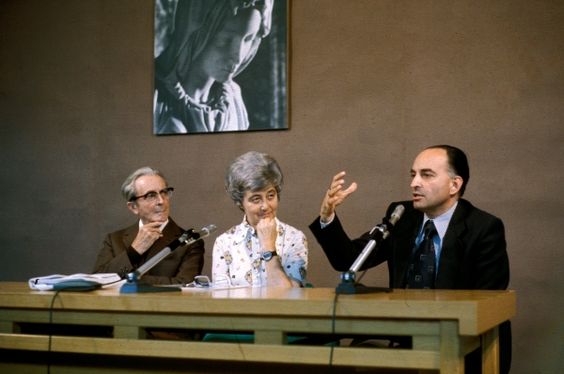
Jan 5, 2018 | Non categorizzato
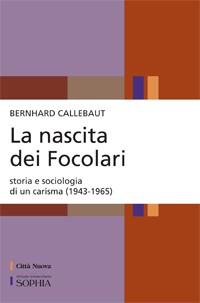 From a small city in northern Italy to five continents: an ample sociological dossier outlines the history of the Focolare, from its birth up to the definitive approval of the Church in 1965. It is a detailed reconstruction, encouraged by the founder of the Focolare herself already in the 1980s, and published for the first time in 2010 in a French edition, and lately translated into Italian by Città Nuova. Piero Coda, Rector of Sophia University Institute, introduces Callebaut’s study in the preface, with these words: “Up to today, there has never been an overall scientific approach to the history of the Focolare […] this current research for the first time constructs and institutes a historical and interpretative dossier of the important phenomenon represented by the Focolare Movement. […] The work is accurate, precise, and as thorough as can be […] exemplary and excellent under the historical profile.” Interviewed by Lorenzo Prezzi for settimananews.it, Bernhard Callebaut (Bruges, 1953) explained the sense of the book: ”I think that the purely testimonial narration, in which the person is strongly felt, is always valid. I think that a book like mine could cancel from my story the beneficial shock experienced in the reading of some pages of Lubich’s first (Meditations) pages that stimulated the actualisation of the messages they contained. On this premise, I think that at a second moment, we have to respect the need to understand, contextualize, link the phenomenon in itself to a previous story and gather some of the future prospects.” With studies in law, philosophy and sociology at the Catholic University of Lovanio, Bernhard Callebaut is currently a professor at Sophia University Institute in Florence, of which he is also Program Director of the Religions in a Global World research group.
From a small city in northern Italy to five continents: an ample sociological dossier outlines the history of the Focolare, from its birth up to the definitive approval of the Church in 1965. It is a detailed reconstruction, encouraged by the founder of the Focolare herself already in the 1980s, and published for the first time in 2010 in a French edition, and lately translated into Italian by Città Nuova. Piero Coda, Rector of Sophia University Institute, introduces Callebaut’s study in the preface, with these words: “Up to today, there has never been an overall scientific approach to the history of the Focolare […] this current research for the first time constructs and institutes a historical and interpretative dossier of the important phenomenon represented by the Focolare Movement. […] The work is accurate, precise, and as thorough as can be […] exemplary and excellent under the historical profile.” Interviewed by Lorenzo Prezzi for settimananews.it, Bernhard Callebaut (Bruges, 1953) explained the sense of the book: ”I think that the purely testimonial narration, in which the person is strongly felt, is always valid. I think that a book like mine could cancel from my story the beneficial shock experienced in the reading of some pages of Lubich’s first (Meditations) pages that stimulated the actualisation of the messages they contained. On this premise, I think that at a second moment, we have to respect the need to understand, contextualize, link the phenomenon in itself to a previous story and gather some of the future prospects.” With studies in law, philosophy and sociology at the Catholic University of Lovanio, Bernhard Callebaut is currently a professor at Sophia University Institute in Florence, of which he is also Program Director of the Religions in a Global World research group.  The first 20 years of the history of the Focolare are fathomed starting from the “enlightenments” of Chiara Lubich, which later became the core of her spirituality. “The charism is always granted to someone in particular, also here,” Callebaut explains. “Only after a certain time, Lubich realised that actually that gift had been bestowed on her and nobody else, at least, not in such a strong, limpid and overwhelming manner. But with time, she realized that also her first companions, who were sent elsewhere – first to Italy, then Europe and the continents – also became in some way, harbingers, multipliers of the charism, ’springs’ in turn. As of today – and in my book it is amply demonstrated – the core of Lubich’s charism is linked to having identified – as a gift – and later developed, and as never before in the two millenniums of Christian life, the meaning of that apex of the passion that constitutes the moment of that cry of abandonment of Man-God.” The history of the Focolare at the start of the story is made up also of a long and suffered wait for the formal recognition of the Church. “At the start of the 1950s the Holy Office examined the papers on the Focolare and initiated a series of meetings with the young founder. To put her and her followers to the test and measure their faithfulness to the Church, they asked her to take a step back, and no longer act as head of the Movement. Her followers would have never hidden who was really the soul of the Movement and there was no leadership crisis during those years, until Paul VI definitively resolved the issue. In 1965 Lubich signed her first letter as president of the Focolare. Today, after a certain time, we are beginning to see that behind her stature as a bearer of spirituality, there was also a rather unusual density of thought.” In more recent years, the charismatic intuition of the founder translates also into a series of concrete proposals as a contribution to the resolution of social and cultural issues. Some of these were Economy of Communion, “which actuates the preferential choice for the poor, and at the same time, values those who are able to contribute to economical life with the not common talent of entrepreneurship,” or the founding of the Sophia Institute, “as an interesting contribution to the debates and ordeals of contemporary thought.” Today, all the members of the Focolare, in some way bring ahead and multiply the charism of Chiara Lubich to fulfill the prayer of Jesus: ‘that all may be one’. And Callebaut concludes: “We need to continue working for some centuries more, it seems.”
The first 20 years of the history of the Focolare are fathomed starting from the “enlightenments” of Chiara Lubich, which later became the core of her spirituality. “The charism is always granted to someone in particular, also here,” Callebaut explains. “Only after a certain time, Lubich realised that actually that gift had been bestowed on her and nobody else, at least, not in such a strong, limpid and overwhelming manner. But with time, she realized that also her first companions, who were sent elsewhere – first to Italy, then Europe and the continents – also became in some way, harbingers, multipliers of the charism, ’springs’ in turn. As of today – and in my book it is amply demonstrated – the core of Lubich’s charism is linked to having identified – as a gift – and later developed, and as never before in the two millenniums of Christian life, the meaning of that apex of the passion that constitutes the moment of that cry of abandonment of Man-God.” The history of the Focolare at the start of the story is made up also of a long and suffered wait for the formal recognition of the Church. “At the start of the 1950s the Holy Office examined the papers on the Focolare and initiated a series of meetings with the young founder. To put her and her followers to the test and measure their faithfulness to the Church, they asked her to take a step back, and no longer act as head of the Movement. Her followers would have never hidden who was really the soul of the Movement and there was no leadership crisis during those years, until Paul VI definitively resolved the issue. In 1965 Lubich signed her first letter as president of the Focolare. Today, after a certain time, we are beginning to see that behind her stature as a bearer of spirituality, there was also a rather unusual density of thought.” In more recent years, the charismatic intuition of the founder translates also into a series of concrete proposals as a contribution to the resolution of social and cultural issues. Some of these were Economy of Communion, “which actuates the preferential choice for the poor, and at the same time, values those who are able to contribute to economical life with the not common talent of entrepreneurship,” or the founding of the Sophia Institute, “as an interesting contribution to the debates and ordeals of contemporary thought.” Today, all the members of the Focolare, in some way bring ahead and multiply the charism of Chiara Lubich to fulfill the prayer of Jesus: ‘that all may be one’. And Callebaut concludes: “We need to continue working for some centuries more, it seems.”
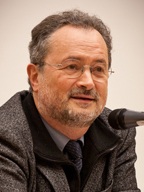 Callebaut Bernhard, Tradition, charisme et prophétie dans le Mouvement international des Focolari. Analyse sociologique, Paris, Nouvelle Cité, 2010, LXXXIII + 537 p. Italian translation La nascita dei Focolari. Storia e sociologia di un carisma (1943-1965), New City – Sophia, Rome 2017, p. 640. Entire interview by Lorenzo Prezzi
Callebaut Bernhard, Tradition, charisme et prophétie dans le Mouvement international des Focolari. Analyse sociologique, Paris, Nouvelle Cité, 2010, LXXXIII + 537 p. Italian translation La nascita dei Focolari. Storia e sociologia di un carisma (1943-1965), New City – Sophia, Rome 2017, p. 640. Entire interview by Lorenzo Prezzi

 I was born and grew up in Macau, a former Portuguese colony is now part of Continental China, where I got to know the Ideal of unity at a Mariapolis. Macau is a small city that can be visited in few hours, so the invitation to take part in a Genfest in Rome, with thousands of young people from around the world – really appealed to me, even though I didn’t have least idea of what it was. We had just begun to live this ideal of unity, with other young people and a few women focolarini who often came to visit us and bring us the news and the concrete life of the Gospel that is lived in the Movement around the world. That world that I had known only through my geography lessons, but that now, with the Ideal of unity, had become smaller and nearer. Just arrived in Rome, several days earlier, we found ourselves in a house with lots of young people from Philippines, Hong Kong, Australia, Latin America…. How could I live with all of them? We Asians were a bit shy and, not knowing the language, we didn’t know how to communicate. Instead, there was no need to talk in order to understand one another, because we had same joy in common and from the very first, there as a very strong mutual understanding among all of us. After only a couple days, we already felt like we were one family. Then we learned that the title of the Genfest was: For A United World. The Genfest was going to be held at an open stadium, so I remember us praying a lot that it wouldn’t rain. Hundreds of buses from Europe were awaiting us. We learned that Chiara Lubich (whom I had not yet met in person) wanted the Genfest to be a moment of God. More than to the fest, Chiara brought us to the essential.
I was born and grew up in Macau, a former Portuguese colony is now part of Continental China, where I got to know the Ideal of unity at a Mariapolis. Macau is a small city that can be visited in few hours, so the invitation to take part in a Genfest in Rome, with thousands of young people from around the world – really appealed to me, even though I didn’t have least idea of what it was. We had just begun to live this ideal of unity, with other young people and a few women focolarini who often came to visit us and bring us the news and the concrete life of the Gospel that is lived in the Movement around the world. That world that I had known only through my geography lessons, but that now, with the Ideal of unity, had become smaller and nearer. Just arrived in Rome, several days earlier, we found ourselves in a house with lots of young people from Philippines, Hong Kong, Australia, Latin America…. How could I live with all of them? We Asians were a bit shy and, not knowing the language, we didn’t know how to communicate. Instead, there was no need to talk in order to understand one another, because we had same joy in common and from the very first, there as a very strong mutual understanding among all of us. After only a couple days, we already felt like we were one family. Then we learned that the title of the Genfest was: For A United World. The Genfest was going to be held at an open stadium, so I remember us praying a lot that it wouldn’t rain. Hundreds of buses from Europe were awaiting us. We learned that Chiara Lubich (whom I had not yet met in person) wanted the Genfest to be a moment of God. More than to the fest, Chiara brought us to the essential. 





